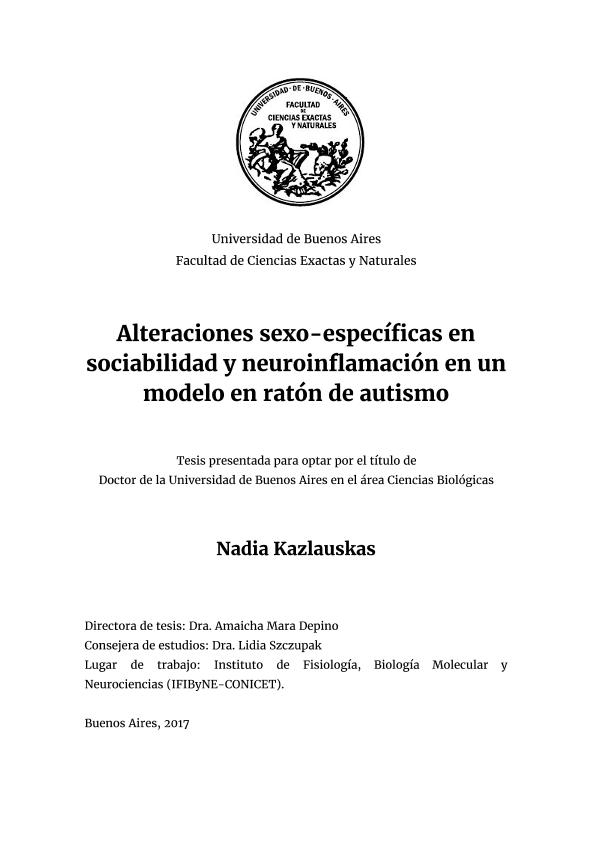Tesis doctoral
El autismo es un desorden del desarrollo neural caracterizado por impedimentos en la interacción social, habilidades comunicativas reducidas y la presencia de comportamientos estereotipados o repetitivos. Estos síntomas típicamente aparecen durante los primeros años de vida, y pueden afectar hasta a 1 en 38 niños, con una incidencia entre tres y cuatro veces mayor en varones que en mujeres. Actualmente no se conoce una única causa del desorden, sino que se proponen múltiples agentes etiológicos. Estudios postmortem realizados en humanos han establecido un nexo entre autismo y neuroinflamación.El objetivo general de esta tesis fue dilucidar el rol de la respuesta inflamatoria del sistema nervioso central, particularmente la activación glial, en el desarrollo del autismo. Para ello utilizamos el modelo de administración prenatal de Ácido Valproico (VPA) en ratón. Encontramos que la exposición al VPA produce una disminución en la sociabilidad de los ratones macho adultos, pero no así de los ratones hembra. Además, las hembras VPA presentan micro y astrogliosis en el cerebelo, y una respuesta inflamatoria periférica exacerbada ante la administración de un estímulo inflamatorio. Sin embargo, dichas alteraciones no se encuentran presentes en los machos.Dado que los síntomas del autismo aparecen de manera temprana durante la infancia, caracterizamos el estado inflamatorio periférico y central en el período postnatal y evidenciamos signos de alteraciones gliales tempranas en cerebelo e hipocampo entre el día postnatal (P) 21 y P35. Con el fin de evaluar el efecto directo de la inflamación postnatal en los niveles de sociabilidad de los animales, administramos un estímulo inflamatorio a lo largo de dicho período crítico. Observamos que la inflamación postnatal afecta diferencialmente la interacción social en los ratones VPA, dependiendo del sexo de los mismos. Mientras las hembras ven reducidos sus niveles de sociabilidad, los machos restauran sus niveles normales.Al estudiar los mecanismos moleculares mediante los cuales se encuentra actuando el VPA, encontramos una disminución en los niveles de acetilación de histonas en el cerebelo de animales P14. Dado que este fenómeno precede al período postnatal crítico, sugerimos que las alteraciones neuroinflamatorias observadas en el modelo podrían estar siendo guiadas por un mecanismo epigenético.Los resultados aquí presentados evidencian efectos sexo-específicos del VPA sobre la sociabilidad y el estado inflamatorio de los animales, tanto central como periférico. Además, se demuestran efectos diferenciales de la inflamación postnatal sobre los comportamientos sociales de machos y hembras. Dado que la mayor parte de la investigación en modelos animales de autismo ha sido desarrollada en animales macho, consideramos que este trabajo puede ayudar en la comprensión de los síntomas particulares observados en las niñas autistas, y adicionalmente aportar evidencias sobre posibles mecanismos de resiliencia dentro de la población femenina. Autism is a neurodevelopmental disorder characterized by impediments in social interaction, reduced communicative skills and the presence of stereotyped or repetitive behaviors. These symptoms typically appear during the first years of childhood, and can affect 1 in 38 children. Remarkably, incidence is three to four times higher in boys than in girls. Although many factors have been implicated in this disorder, the exact underlying causes are still unclear. Postmortem studies performed in humans have established a link between autism and neuroinflammation. The general aim of this thesis was to elucidate the role of the central nervous system inflammatory response, glial activation in particular, in autism development. To do this, we used the Valproic Acid (VPA) prenatal administration mouse model. We found that VPA exposure produces decreased sociability in adult male mice, but not in females. Besides, we have found that adult female mice show increased micro and astroglial cell density in the cerebellum, and an exacerbated peripheral inflammatory response upon the administration of an inflammatory stimulus. However, these alterations are not present in male mice. Given that autism symptoms appear early in childhood, we characterized the peripheral and neuroinflammatory state along the postnatal period and found early signs of glial activation in the cerebellum and hippocampus between postnatal day (P) 21 and P35. To further explore the direct effect of postnatal inflammation on sociability, we administered an inflammatory stimulus during this critical period. We found that eliciting postnatal inflammation produces distinct behavioral outcomes depending on sex. While female mice show reduced sociability, male mice restore their normal social levels. When studying the molecular mechanisms behind VPA effects, we found a decrease in histone acetylation levels in the cerebellum of P14 animals. Given that this phenomenon precedes the postnatal critical period, we suggest that the neuroinflammatory alterations present in our model could be guided by an epigenetic mechanism. The results presented here evidentiate VPA sex-specific effects on mice sociability and on the peripheral and neuroinflammatory state. Additionally, we have proven differential effects of postnatal inflammation on social behavior in male and female VPA mice. Given that most of the research on animal models of autism has been conducted in male subjects, we consider that this work could help understand the particular symptoms observed in autistic girls, and also contribute with evidences of possible resiliency mechanisms in the female population.
Alteraciones sexo-específicas en sociabilidad y neuroinflamación en un modelo en ratón de autismo
Título:
Sex-specific social and neuroinflammatory alterations in a mouse model of autism
Fecha de publicación:
01/01/2017
Idioma:
Español
Clasificación temática:
Resumen
Palabras clave:
Autismo
,
Neuroinflamacion
,
Sociabilidad
,
Modelo Animal
Archivos asociados
Licencia
Identificadores
Colecciones
Tesis(IFIBYNE)
Tesis de INST.DE FISIOL., BIOL.MOLECULAR Y NEUROCIENCIAS
Tesis de INST.DE FISIOL., BIOL.MOLECULAR Y NEUROCIENCIAS
Citación
Kazlauskas, Nadia; Depino, Amaicha Mara; Szczupak, Lidia; Alteraciones sexo-específicas en sociabilidad y neuroinflamación en un modelo en ratón de autismo; 1-1-2017
Compartir




